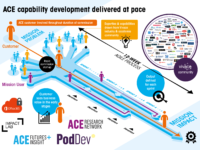A proof of concept has been created to incorporate design techniques in many elements of a PoD's life cycle, planning for future demands and overcoming existing hurdles. The proposed strategy prioritizes the needs of persons with disabilities and helps them acquire the resources and services they need. It also helps families gain confidence in caring for a disabled kid. This helps POD engage, lead, create, and sustain life.
Innovation Tag: Process Facilitation and Co-design
GovTech Edu works with the Indonesia MoECRT to build a technology ecosystem to create an irreversible transformation for Indonesia’s education system. It includes tech platforms made available for teachers, school principals, university students & practitioners, through products like Teacher SuperApp, Education Scorecard & University Internship Matchmaking Platform. With these, the transformation to improve student learning outcomes becomes more inclusive, data driven & impact-enabling at…
The Ukraine war established a commitment to work across sectors to improve digital services to refugees. Focus on end user needs and an unbureaucratic organizational model have produced tangible results such as:
Better update of address information in national register
Electronic identification - access to digital services
Twelve agencies worked with obstacles and bottlenecks in the refugee's user journey, with the objective of good transitions between services.
Officina is a lab for innovation in the public sector whose main objective is to catalyse the energy of young talents by offering them a transformative training programme. Officina was developed to address a triple urgency: future decision makers not perceiving the public sector as an attractive workplace; the public sector having high average age workforce and lack of innovative approaches; society at large needing a more modern and appealing public sector in this key historical moment.
MedeINN arose from the need to innovate in the government sector, in a city that had been developing its innovation capabilities in all other sectors. For this reason, and under Innovative State premise, we seek to connect the Mayor's Office of Medellín´s challenges with entrepreneurs and researchers capacities. This has been achieved after a redesign of a Public Procurement for Innovation methodology, which enables Open Innovation in the government sector.
Case Study
‘Con Vos’ Network: Digitalization for Effective Governance. Community Markets to Improve Access…

When applying for state aid or other services without the means or knowledge to do it online due to the digital gap, it usually takes a day or waiting in queues and filling out paperwork. Communities have thought and offered a grassroot solution: store owners helping their peers to get online procedures done in their business, in exchange for a small fee. It is a simple innovation, yet effective when it comes to decentralize public services, foster digital inclusion, and strengthen local markets
With the Quality Tools an organisation can evaluate, monitor and compare the quality and use of its services within and between organisations. The tools include a Self-assessment, Customer Feedback and Utilisation Rate Measurement tool and are free of charge. The tools were developed primarily for public sector organisations to help them develop customer-oriented digital services and improve knowledge-based management. On a national level the tools provide data on the state of digitalisation.
How to bring new ways of working and problem-solving tools to the Estonian public sector? Over the course of a year and a half the Public Sector Innovation Team of Estonia developed a design sprint format suitable for the Estonian public sector. By constantly adapting and improving the format the Innovation Team has seen that it is a highly effective tool for spreading design thinking methods and generating enthusiasm around them.
Since 2020, the City of Austin (COA) and the University of Texas (UT) have collaborated on over twenty diverse research projects under the legal and administrative framework of a five-year, ten million dollar master interlocal agreement (ILA). Among a very few of its kind in the USA, this ILA is an "innovation enabling innovation" that bridges the barriers between two large, extremely complex organizations and fast-tracks the launch of research and innovation projects by four to five times.
Government struggles to exploit advances in science and technology that could improve public services. The UK Home Office developed a new, cost-effective model to enable start-ups, Small and Medium-sized Enterprises (SMEs), not-for-profits and academia to solve frontline challenges across UK government using diverse, cutting-edge capabilities and expertise. Uniquely, for UK public sector, it uses flexible, novel ways of working and commercial mechanisms to deliver mission impact at pace.





